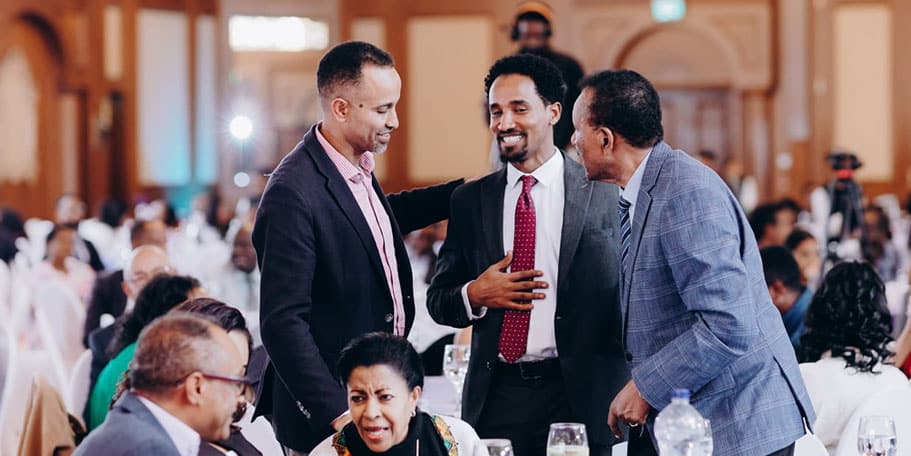A father’s ordeal Illuminates a growing struggle with stroke
On an otherwise ordinary night in Addis Ababa, Biniyam Bekele’s life tilted without warning. A day before his daughter was scheduled to defend her undergraduate thesis, a phone call delivered the news every parent dreads: she had suffered a sudden stroke and been rushed to the hospital.
Only hours earlier, she had called her father brimming with confidence, saying she was ready for the presentation and certain she would excel. But before they could share in her anticipation, Biniyam heard her voice twist into agony mid-conversation. She complained of a sharp headache; then the line went dead.
“I called back and someone told me she had been taken to the hospital,” he recalled. “I found myself standing next to my daughter, lying motionless on a hospital bed. I cannot describe the chilling sensation that went through my body.”
For Biniyam, the shock was compounded by helplessness. “Stroke is one of the most difficult illnesses to confront, particularly for parents,” he said. “Anyone who has witnessed its impact will understand. For a moment, I felt as if I had already lost my child.”
A friend’s tip about the Axon Stroke and Spine Centre—housed within the Ethiopian Stroke Foundation (ESF) in Addis Ababa—offered a lifeline. After emergency care and rehabilitation, his daughter survived. Biniyam calls it a rebirth. “She was born again,” he said, expressing gratitude to the center’s medical staff.
His story underscores a larger crisis. Stroke is a leading cause of death and disability worldwide, but its toll is especially severe in low- and middle-income countries, where public awareness is low and access to rapid treatment limited.
The Ethiopian Stroke Foundation, established by Wondewossen Gebreamanuel (MD), is trying to change that trajectory. At a launch event at the Sheraton Addis, the organization unveiled an ambitious initiative to expand treatment, train healthcare workers, and promote prevention nationwide.
The gathering drew medical specialists, stroke survivors, development partners, policy leaders and members of the public—including Addis Ababa Mayor Adanech Abebe—to highlight the foundations work and vision. Beyond acute care, the initiative emphasizes community education, public campaigns, and capacity building. Organizers say the goal is to help Ethiopians recognize risk factors and warning signs earlier, while ensuring hospitals and clinics are equipped to respond.
Wondewossen explained the organization’s central mission is to create a “stroke-informed society” and open new avenues for collaboration. ESF, he noted, is committed to public education and to building platforms for dialogue aimed at reducing the burden of stroke, saving lives and improving outcomes for the thousands of Ethiopians affected each year.
He traced the crisis to a familiar set of obstacles: lack of awareness, shortages of medical facilities and equipment, and health systems still preoccupied with communicable diseases. “Between 70 and 89 percent of stroke cases occur in developing countries,” he said. “One reason is that many are still battling diseases like cholera, HIV/AIDS and malaria, while developed nations have managed to control those illnesses and shift their focus to noncommunicable diseases such as stroke.”
Ethiopia mirrors that pattern. Since its founding, ESF has offered free therapeutic support to stroke survivors—a lifeline in a system where such services are often unaffordable or unavailable. “Advocacy and awareness are crucial to stopping the rise in stroke cases,” Wondewossen said, adding that research initiatives are also beginning to generate data to guide clinicians, policymakers and other stakeholders. The foundation plans to expand its training programs, extending prevention education to more institutions and communities in the coming years.
At the Axon Stroke and Spine Centre, the foundation’s clinical arm, more than 100 patients—from toddlers to centenarians—have received care. Roughly one in five comes from outside Addis Ababa, a sign of how far people will travel for treatment. Cases are climbing nationwide, driven by poor lifestyle habits, limited access to care and scant public knowledge.
During the launch event, Adanech called for greater community awareness and education, describing stroke as a devastating and often incurable disease. She warned that the shortage of medical professionals and lack of public understanding remain major barriers to tackling the crisis effectively.
Calling for unity in the fight against stroke, the Mayor announced that her administration has allocated two hectares of land for the construction of a dedicated medical center specializing in stroke care and rehabilitation. The facility, she said, is envisioned not only as a treatment hub but also as a training ground for healthcare professionals—an effort to ease Ethiopia’s acute shortage of specialists.
She also framed the project as an economic imperative. Strengthening domestic treatment options, she argued, would reduce the need for Ethiopians to seek care abroad. “Investing in Ethiopia’s healthcare sector is crucial for both economic and social reasons,” she said. “By improving local medical services, the country can prevent citizens from traveling overseas for treatment, thereby retaining foreign currency and ensuring high-quality care is available to all.”
Tariku Assefa (MD), director of the Axon Stroke and Spine Centre, echoed her sense of urgency. Stroke cases in Ethiopia, he said, are rising at an alarming rate, but simple measures and lifestyle changes could dramatically slow the trend. He identified four key pillars for tackling the crisis: public awareness, proper treatment, anatomical research tailored to the Ethiopian context, and the training of specialized professionals.
With the number of patients continuing to grow, Biniyam’s daughter is just one among many. Experts stress that stroke does not discriminate by age and that timely, effective treatment is critical to reducing long-term risks. “More than 80 percent of stroke attacks can be prevented if the necessary measures are taken before the condition advances to a severe stage,” Tariku said.
As the Ethiopian Stroke Foundation expands its mission, medical professionals say they are cautiously optimistic. They believe that greater awareness, combined with improved healthcare infrastructure, could reduce stroke incidence and improve the quality of life for thousands of Ethiopians.






